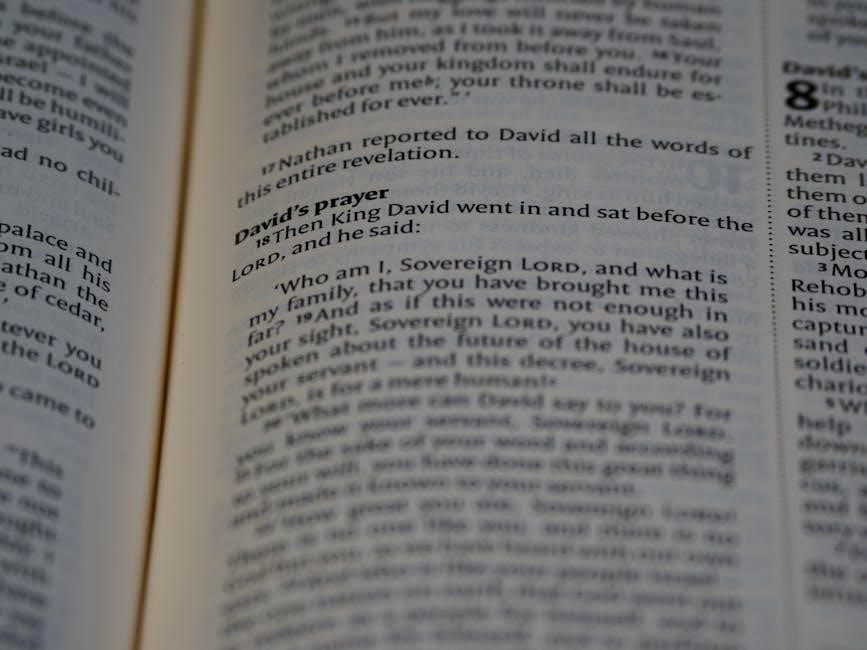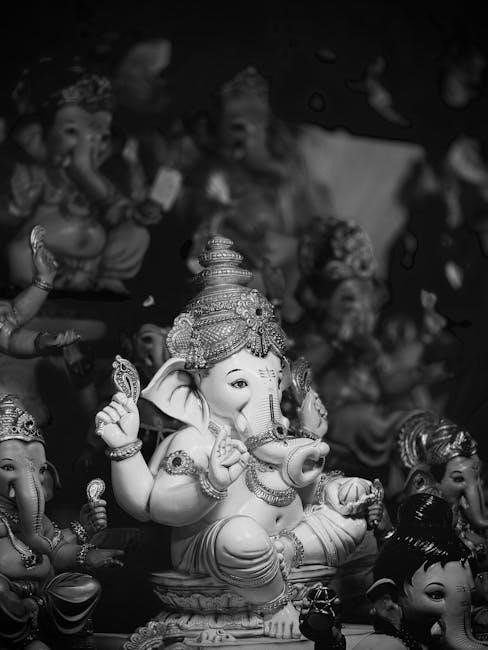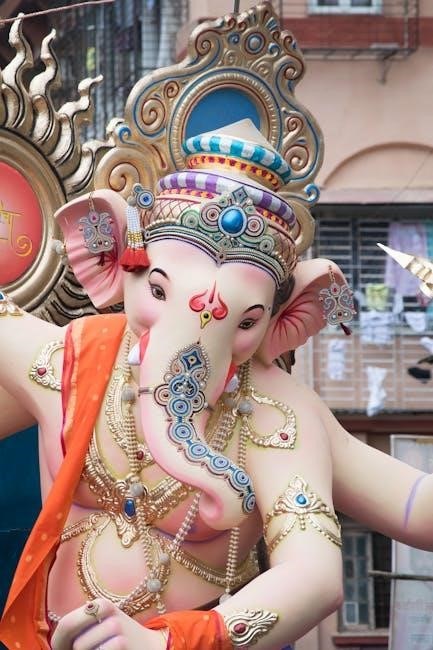Lord of the Flies, written by William Golding, is a timeless allegorical novel exploring human nature, civilization, and savagery. Its significance lies in its profound themes and universal relevance, making it a cornerstone of modern literature. The novel’s exploration of morality, power, and societal breakdown continues to resonate globally, offering insights into the human condition. Available in PDF format, the book remains accessible and widely studied, ensuring its enduring impact on readers worldwide.
1.1 Overview of the Novel and Its Author, William Golding
William Golding, a renowned British author and Nobel laureate, crafted Lord of the Flies in 1954. This allegorical novel explores the descent into chaos of young boys stranded on a remote island, reflecting Golding’s insights into human nature. Born in 1911 and passing in 1993, Golding’s experiences in World War II deeply influenced his writing. The novel’s themes of morality, savagery, and societal collapse have made it a literary masterpiece. Its availability in PDF format ensures accessibility for readers worldwide, preserving its timeless relevance.
1.2 The Historical Context and Themes of the Novel
Lord of the Flies, set against the backdrop of World War II, reflects Golding’s exploration of human nature amid chaos. The novel’s themes of savagery, civilization, and fear resonate deeply, influenced by the post-war era’s disillusionment. Golding’s portrayal of boys descending into primal behavior mirrors the destruction wrought by dictators and societal collapse. The novel serves as an allegory for inherent human evil, emphasizing the fragility of morality. Its availability in PDF format allows readers to delve into these timeless themes, ensuring its relevance across generations.

How to Download “Lord of the Flies” in PDF Format
To download Lord of the Flies in PDF, visit legal sources like online libraries or eBook platforms. Ensure compliance with copyright laws. Free and paid options are available, offering varying quality and convenience for readers seeking digital copies of William Golding’s classic novel.
2.1 Legal Sources for Downloading the PDF
Several legal sources offer Lord of the Flies in PDF format. Popular options include Google Books, Project Gutenberg, and Faber and Faber’s official website. Many online libraries and eBook platforms like Amazon Kindle and Kobo provide secure downloads. Ensure compliance with copyright laws by purchasing or downloading from reputable sites. These sources guarantee high-quality, virus-free files, making them ideal for readers seeking a reliable digital copy of William Golding’s classic novel.
2.2 Free vs. Paid Options: A Guide to Choosing the Right Source
When selecting a source for Lord of the Flies in PDF, consider free and paid options. Free downloads may be available from public libraries or educational websites but often have limitations, such as watermarks or incomplete content. Paid options, like eBooks from Amazon Kindle or Faber and Faber, offer high-quality, complete versions while supporting authors and publishers. Choose based on your needs: free for casual reading or paid for a professional, uninterrupted experience. Always verify the source’s legitimacy to avoid illegal or low-quality downloads.
The Plot and Key Elements of “Lord of the Flies”
Lord of the Flies tells the story of boys stranded on an island, exploring themes of survival, power, and morality. The novel’s key elements include the symbolic conch shell, representing order, and the beast, embodying fear. Golding’s vivid portrayal of societal collapse and human nature’s darker aspects makes the story gripping and thought-provoking, resonating with readers globally.
3.1 Summary of the Story and Its Allegorical Meaning
Lord of the Flies, by William Golding, tells the story of boys stranded on an island after a plane crash, attempting to create a utopian society. As order collapses, the group descends into chaos and savagery. The novel serves as an allegorical microcosm of human nature, exploring themes of civilization, power, and inherent evil. Symbols like the conch shell (democracy) and the beast (fear) highlight the struggle between morality and primal instincts, reflecting the darker aspects of humanity and societal structures.
3.2 Analysis of Major Characters and Their Roles
Ralph, the protagonist, represents order and democracy, striving to maintain civilization. Jack embodies the descent into savagery, driven by power and primal urges. Piggy, with his rationality and glasses symbolizing clarity, advocates for peace and wisdom. Simon, the moral compass, uncovers the true nature of evil, his death signifying lost innocence. These characters symbolize humanity’s duality, highlighting civilization versus savagery, reason versus instinct, and good versus evil in Golding’s exploration of human nature.

Study Guides and Resources for Understanding the Novel
Study guides offer chapter-by-chapter summaries, theme analyses, and explanations of symbols and motifs. Available in PDF format, these resources enhance comprehension and provide deeper insights into Golding’s work.
4.1 Chapter-by-Chapter Summaries and Analysis

Chapter-by-chapter summaries provide a detailed breakdown of events, enabling readers to track the boys’ descent into chaos. Analysis of these chapters reveals Golding’s exploration of themes like power, fear, and morality. Key moments, such as the discovery of the conch shell and the beast’s emergence, are examined for their symbolic significance. PDF study guides often include character development timelines and thematic overviews, helping readers grasp the novel’s complexity and allegorical depth. These resources are invaluable for both students and enthusiasts seeking a deeper understanding of Golding’s masterpiece.
4.2 Themes, Symbols, and Motifs Explained
Lord of the Flies explores themes of savagery versus civilization, fear, and the nature of humanity. Symbols like the conch shell represent order and democracy, while the beast embodies fear and the unknown. The pig’s head, or “Lord of the Flies,” symbolizes evil and corruption. Motifs such as the descent into chaos and the loss of innocence are central to the narrative. PDF guides often analyze these elements, providing insights into Golding’s use of symbolism to convey the novel’s profound moral and philosophical questions.

Scholarly Articles and Essays on “Lord of the Flies”
Scholars have extensively analyzed Lord of the Flies, exploring its themes of human nature, society, and morality. Essays delve into psychological interpretations, symbolic significance, and critical reviews, offering deep insights into Golding’s work. These academic perspectives are widely available in PDF formats, providing readers with a richer understanding of the novel’s complexity and relevance.
5.1 Psychological and Sociological Interpretations of the Novel
Lord of the Flies is a profound exploration of human psychology and sociology. Scholars analyze the novel as a microcosm of society, examining how fear, power, and morality shape behavior. The boys’ descent into savagery reflects Freudian concepts of the id and superego, while their societal structures critique human hierarchies. Essays in PDF formats delve into these themes, offering insights into Golding’s portrayal of innate human frailties and the effects of isolation on group dynamics. These interpretations highlight the novel’s relevance to understanding human nature and societal breakdowns.
5.2 Critical Reviews and Academic Perspectives
Lord of the Flies has garnered extensive academic attention, with scholars praising its depth and complexity. Critics highlight its exploration of human nature, morality, and societal structures. PDFs of scholarly articles reveal diverse perspectives, from psychological analyses to sociological critiques. Many scholars view the novel as a microcosm of society, examining how fear, power, and survival instincts shape human behavior. These reviews underscore Golding’s ability to provoke thought on universal themes, making the novel a subject of enduring academic interest and debate.

The Significance of the PDF Format for Readers
The PDF format ensures consistent formatting and readability across devices, enhancing accessibility. Features like highlighting, annotations, and night mode improve the reading experience, making it more convenient and engaging for users.
6.1 Accessibility and Convenience of Digital Copies
Digital copies of Lord of the Flies in PDF format offer unparalleled accessibility and convenience. Readers can access the novel on various devices, including smartphones, tablets, and laptops, without needing physical storage space. PDFs ensure consistent formatting and readability, making the text clear and easy to navigate. Additionally, features like search, highlighting, and annotation tools enhance the reading experience. The portability of digital copies allows readers to engage with the novel anytime, anywhere, fostering a deeper connection with Golding’s timeless themes.
6.2 Features of PDFs That Enhance the Reading Experience
PDF versions of Lord of the Flies provide features that significantly enhance readability and engagement. The format ensures consistent text and layout across devices, preserving the author’s intent. Search functionality allows quick access to specific passages, while adjustable font sizes and night mode cater to individual reading preferences. Annotations and highlighting tools enable deeper interaction with the text, fostering analysis and study. These features make the PDF a versatile and user-friendly option for readers seeking an enriched experience of Golding’s classic novel.

Adaptations and Related Works
Lord of the Flies has been adapted into films, stage plays, and TV series, expanding its reach. William Golding’s other works, like The Inheritors and Pincher Martin, explore similar themes, enriching his literary legacy. These adaptations and related works highlight Golding’s enduring influence, offering diverse perspectives on his storytelling and philosophical insights.
7.1 Film, Stage, and TV Adaptations of the Novel
Lord of the Flies has been adapted into multiple films, stage plays, and a forthcoming TV series. The 1963 and 1990 film versions brought the novel’s themes to life, while stage adaptations have captivated audiences globally. A new TV series by Eleven Films promises to reimagine Golding’s vision, further cementing the novel’s influence. These adaptations highlight the story’s universal appeal, offering fresh interpretations of its timeless themes. The novel’s enduring relevance continues to inspire creators across media.
7.2 Other Works by William Golding and Their Connection to “Lord of the Flies”
William Golding’s works, such as The Inheritors and Pincher Martin, explore similar themes of human nature and morality. These novels, like Lord of the Flies, delve into the complexities of survival, power, and societal structures. Free Fall examines existential themes, while Rites of Passage critiques societal hierarchies. Golding’s oeuvre reflects his deep understanding of human behavior, linking all his works thematically to the primal instincts and ethical dilemmas central to Lord of the Flies. His writing legacy continues to provoke thought on humanity’s dual nature.
Lord of the Flies remains a powerful exploration of humanity, morality, and civilization. Its themes resonate universally, making it a timeless classic. Accessing it in PDF format ensures its enduring accessibility and relevance for future readers.
8.1 The Enduring Relevance of “Lord of the Flies” in Modern Literature
Lord of the Flies remains a cornerstone of modern literature due to its timeless exploration of human nature, morality, and societal structures. Its themes of power, fear, and the duality of civilization versus savagery continue to resonate with readers today. The novel’s allegorical style allows it to transcend generations, making it a vital text for understanding human behavior. Its availability in PDF format ensures accessibility, further cementing its place as a classic in contemporary literary discourse and education.
8.2 Encouragement to Read and Explore the Novel Further
Lord of the Flies is a gripping and thought-provoking novel that invites readers to reflect on human nature and societal dynamics. Its universal themes make it a must-read for anyone interested in literature, psychology, or philosophy. With its availability in PDF format, accessing the novel has never been easier. Readers are encouraged to delve into its pages to uncover the deeper meanings and connections that make it a timeless classic. Exploring further will reveal why it remains a pivotal work in modern literary studies.
